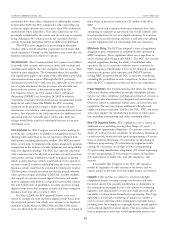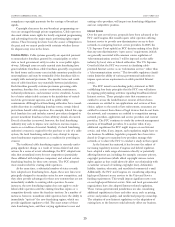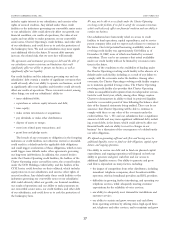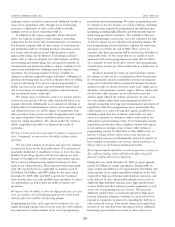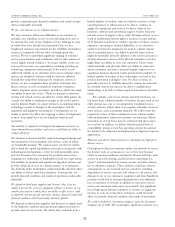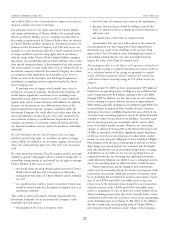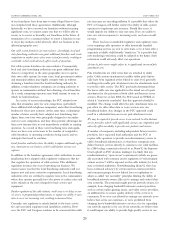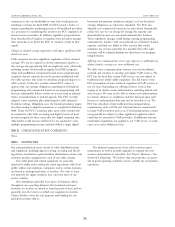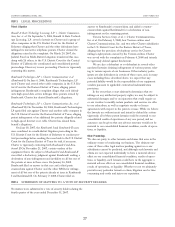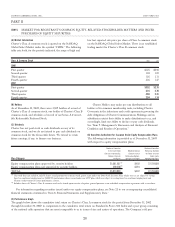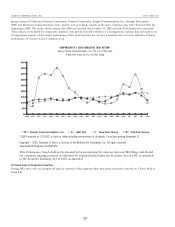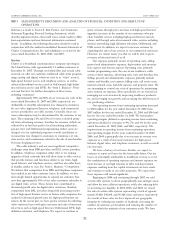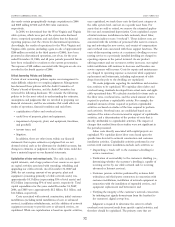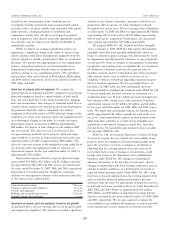Charter 2007 Annual Report Download - page 35
Download and view the complete annual report
Please find page 35 of the 2007 Charter annual report below. You can navigate through the pages in the report by either clicking on the pages listed below, or by using the keyword search tool below to find specific information within the annual report.
The loss of Mr. Allen’s services could adversely affect our ability to
manage our business.
Mr. Allen is Chairman of Charter’s board of directors and
provides strategic guidance and other services to us. If we were
to lose his services, our growth, financial condition, and results of
operations could be adversely impacted.
The special tax allocation provisions of the Charter Holdco limited lia-
bility company agreement may cause us in some circumstances to pay
more taxes than if the special tax allocation provisions were not in
effect.
Charter Holdco’s limited liability company agreement provided
that through the end of 2003, net tax losses (such net tax losses
being determined under the federal income tax rules for deter-
mining capital accounts) of Charter Holdco that would otherwise
have been allocated to us based generally on our percentage
ownership of outstanding common membership units of Charter
Holdco, would instead be allocated to the membership units held
by Vulcan Cable III Inc. (“Vulcan Cable”) and CII. The purpose
of these special tax allocation provisions was to allow Mr. Allen
to take advantage, for tax purposes, of the losses generated by
Charter Holdco during such period. In some situations, these
special tax allocation provisions could result in our having to pay
taxes in an amount that is more or less than if Charter Holdco
had allocated net tax losses to its members based generally on
the percentage of outstanding common membership units owned
by such members. For further discussion on the details of the tax
allocation provisions see “Part II. Item 7. Management’s Discus-
sion and Analysis of Financial Condition and Results of Oper-
ations – Critical Accounting Policies and Estimates – Income
Taxes.”
Risks Related to Regulatory and Legislative Matters
Our business is subject to extensive governmental legislation and regula-
tion, which could adversely affect our business.
Regulation of the cable industry has increased cable operators’
operational and administrative expenses and limited their reve-
nues. Cable operators are subject to, among other things:
krules governing the provision of cable equipment and com-
patibility with new digital technologies;
krules and regulations relating to subscriber privacy;
klimited rate regulation;
krules governing the copyright royalties that must be paid for
retransmitting broadcast signals;
krequirements governing when a cable system must carry a
particular broadcast station and when it must first obtain
consent to carry a broadcast station;
krequirements governing the provision of channel capacity to
unaffiliated commercial leased access programmers;
krules limiting our ability to enter into exclusive agreements
with multiple dwelling unit complexes and control our
inside wiring;
krules and regulations relating to provision of voice
communications;
krules for franchise renewals and transfers; and
kother requirements covering a variety of operational areas
such as equal employment opportunity, technical standards,
and customer service requirements.
Additionally, many aspects of these regulations are currently
the subject of judicial proceedings and administrative or legisla-
tive proposals. There are also ongoing efforts to amend or
expand the federal, state, and local regulation of some of our
cable systems, which may compound the regulatory risks we
already face. Certain states and localities are considering new
cable and telecommunications taxes that could increase operating
expenses.
Our cable system franchises are subject to non-renewal or termination.
The failure to renew a franchise in one or more key markets could
adversely affect our business.
Our cable systems generally operate pursuant to franchises,
permits, and similar authorizations issued by a state or local
governmental authority controlling the public rights-of-way.
Many franchises establish comprehensive facilities and service
requirements, as well as specific customer service standards and
monetary penalties for non-compliance. In many cases, franchises
are terminable if the franchisee fails to comply with significant
provisions set forth in the franchise agreement governing system
operations. Franchises are generally granted for fixed terms and
must be periodically renewed. Franchising authorities may resist
granting a renewal if either past performance or the prospective
operating proposal is considered inadequate. Franchise authori-
ties often demand concessions or other commitments as a
condition to renewal. In some instances, local franchises have not
been renewed at expiration, and we have operated and are
operating under either temporary operating agreements or with-
out a franchise while negotiating renewal terms with the local
franchising authorities. Approximately 15% of our franchises,
covering approximately 20% of our video customers, were
expired as of December 31, 2007. Approximately 7% of addi-
tional franchises, covering approximately an additional 8% of our
video customers, will expire on or before December 31, 2008, if
not renewed prior to expiration.
The traditional cable franchising regime is currently under-
going significant change as a result of various federal and state
actions. Some of the state franchising laws do not allow us to
immediately opt into statewide franchising until (i) we have
completed the term of the local franchise, in good standing, (ii) a
competitor has entered the market, or (iii) in limited instances,
where the local franchise allows the state franchise license to
apply. In many cases, state franchising laws, and their varying
application to us and new video providers, will result in less
franchise imposed requirements for our competitors who are
new entrants than for us until we are able to opt into the
applicable state franchise.
We cannot assure you that we will be able to comply with
all significant provisions of our franchise agreements and certain
CHARTER COMMUNICATIONS, INC. 2007 FORM 10-K
24


